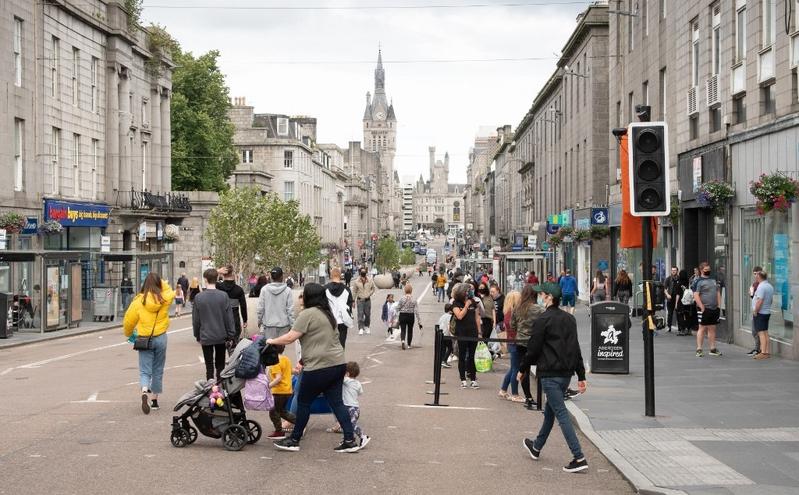 Residents walk in central in Aberdeen, eastern Scotland on Aug 5, 2020 following the announcement that a local lockdown has been imposed on the city after a spike in the number of cases of novel coronavirus COVID-19. (MICHAL WACHUCIK / AFP)
Residents walk in central in Aberdeen, eastern Scotland on Aug 5, 2020 following the announcement that a local lockdown has been imposed on the city after a spike in the number of cases of novel coronavirus COVID-19. (MICHAL WACHUCIK / AFP)
Efforts by the United Kingdom to avoid massive pandemic-related job losses must be improved, stakeholders said on Wednesday after the release of a survey of more than 500 companies conducted by the British Chambers of Commerce, or BCC.
Airlines have suffered as a result of travel bans brought in by many nations to limit the spread of the virus
Only 43 percent of enterprises said they will participate in government initiatives unveiled last month by Chancellor of the Exchequer Rishi Sunak that include a 1,000-pound (US$1,315) "bonus" for each furloughed worker brought back to the workplace, a subsidy toward the pay of young people, and grants for apprentices and trainees.
Instead, around one third of companies expect to lay off workers as the government's furlough program that the new initiatives replace winds down. The program had paid 9 million employees who could not attend their workplace because of the novel coronavirus lockdown and who could not work from home up to 2,500 pounds a month.
ALSO READ: Johnson lambasted for lifting UK virus border controls in March
The furlough program is set to end in the fall and the BCC, said the replacement initiatives have failed to impress.
Claire Walker, the BCC's co-executive director, said: "Expected usage of schemes announced in the summer statement is relatively low, indicating they do not provide the right kind of support for many businesses at this critical time and a rethink is needed."
She urged the government to instead bring in tax cuts for businesses.
But a Treasury spokesman told the Financial Times: "This survey does not give an accurate picture of the take-up of the support announced last month as it was carried out before the publication of much of the relevant guidance and the engagement with business."
The newspaper said more than half of British companies had a drop in cash flow in July, despite the easing of lockdown restrictions.
Grim position
The grim position many enterprises are in was made clear this week when multinational oil and gas company British Petroleum, or BP, halved its shareholder dividend and posted a US$6.7 billion quarterly loss.
The London-headquartered company said the virus and resulting lockdowns had reduced global demand for oil, leading it to cut its oil price forecasts and write down the value of its assets. BP plans to cut 10,000 jobs worldwide, with up to 2,000 cuts to come from its UK workforce.
The challenging times have also hit Richard Branson's Virgin Atlantic airline, which told a UK court this week it could run out of cash next month if creditors do not approve a 1.2-billion-pound rescue deal.
The company has already announced at least 3,000 job cuts from its UK operation, and pulled out of London Gatwick Airport.
Airlines have suffered as a result of travel bans brought in by many nations to limit the spread of the virus, but the timing of the UK's border closure was slammed this week by members of Parliament sitting on the House of Commons' home affairs select committee.
They said in a report released on Wednesday that a delay in closing the border accelerated the spread of the virus as "thousands of people with COVID-19 arrived in or returned to the UK in February and March".
READ MORE: UK plans to fight obesity with advert bans, calorie labels
Yvette Cooper, chair of the committee that produced the report, told the BBC: "The UK was almost unique in having no border checks or quarantine arrangements at that time. That alone should have rung loud alarm bells for ministers and made them think again."
The children's commissioner for England, meanwhile, has urged the government not to backtrack on its plan to reopen all schools in September and to prioritize them if there are any localized lockdowns.
Anne Long field, the children's commissioner for England, said:"Schools must be the first to reopen and the last to close during any local lockdowns."


